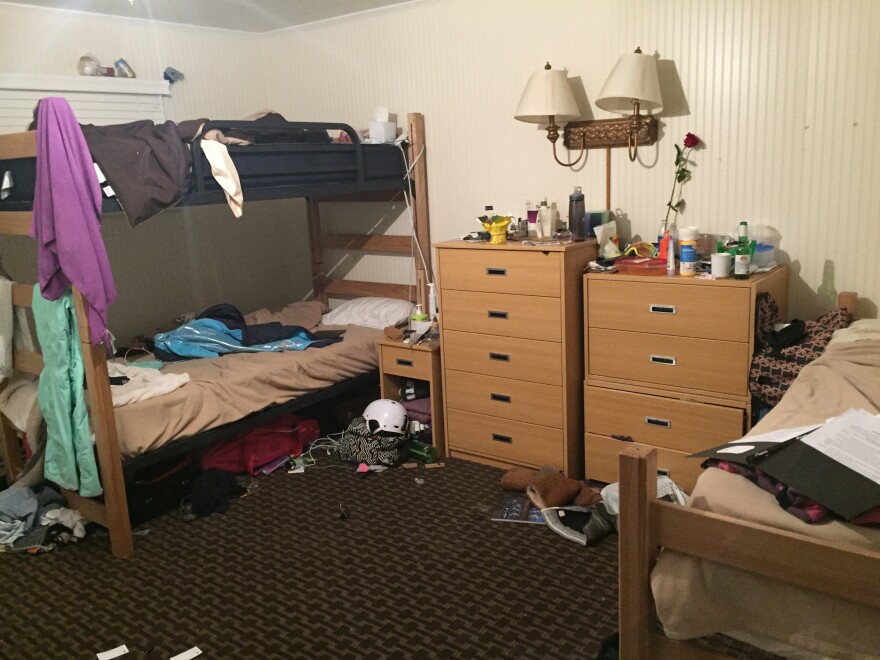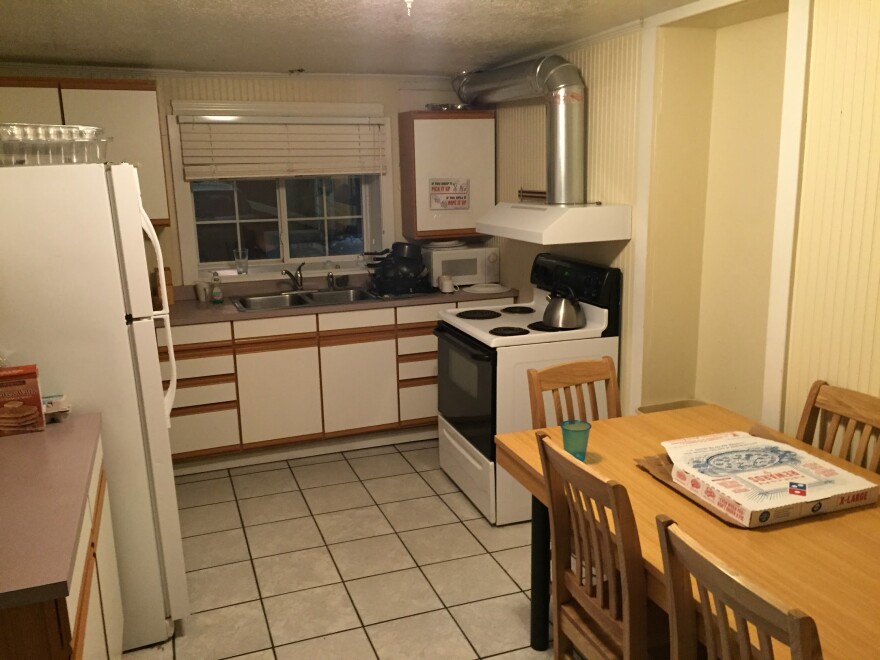Sandra Cuadrado spends most of her time studying dentistry at a university in Peru. But right now it is the 21-year-olds’ summer vacation, and Cuadrado has spent these last few months living and working the winter season in Jackson on a J-1 Exchange Visitor student visa.
“The idea of traveling here in the United States was to know more about this culture,” Cuadrado said. “And improve [my] English.”
But Cuadrado said her English hasn’t gotten much better. Same for 22-year-oldAntuannette Mendoza, who studies Hospitality Management in Peru, and is also here on a J-1 visa.
“I thought here I would live with American people or people from other countries,” she said. "But we are all from the same town!”

The six other Peruvian J-1 students in the room laugh and nod their heads. It’s a former hotel room that’s been transformed by the Terra Hotel and Teton Mountain Resort into housing for their J-1 students—the ones here work mostly as housekeepers.
The J-1 Exchange Visitor Visa program was created by Congress in 1961to promote “educational and cultural exchange” between mainly foreign students and Americans. Students who come here are supposed to be put in jobs where they regularly come into contact with Americans. And they are supposed to have activities planned for them to experience American culture. But these J-1 students say that's not really happening. Neither is the English practice.
“We are practicing another language, I think,” said Cuadrado. “We are practicing Mexican! Because all the housekeepers are Mexican.”
Tyler Barker is the General Manager for the Terra Hotel and Teton Mountain Lodge. He said that if these students want to improve their English, it’s something they need to commit to.
“What we would hope, and what we ask, is that for all radio communication in the housekeeping department try to use English to the best of their ability.”
Barker points out that the hotels offer six free ski and snowboard passes for all of its 340 employees to share (Human Resources Director Fiona Wilson said over the last month or so passes were unused about 40 percent of the time) and discounts on a number of other cultural happenings around town.
Performing Arts student Marisol Barba said she enjoys working as a server at one of the hotels’ restaurants. But she said her housing is disappointing. Barba’s three-person room is cramped, even for Jackson.
“It’s a college dorm room for two people,” she said while surveying the room. “But instead of two beds it has a bunk bed and a twin bed, and it has no closet.”

Fiona Wilson pointed out that the students were shown pictures of the accommodations they would be getting before taking their jobs. But those students pay $500-$600 each to share the rooms. And at Barba’s housing location, the kitchen is shared by 40-50 people. General Manager Travis Barker said he loses money on housing overall, but the J-1 students said rent can be a real burden. The hotels promised them an average of 32 hours per week per season, but paychecks vary, sometimes a lot. “One week I [worked] 24 hours,” said Antuanette Mendoza.
Mendoza said during that two week pay period she made $525—and $275 of that went to pay her rent.
“I didn’t expect that,” she said.
Some of Terra Hotel and Teton Mountain Lodge’s J-1 students this season live in nicer housing, and generally have had a better time. Human Resources Director Fiona Wilson said about a quarter of the J-1 students who worked for the hotels in the summer of 2015 will be returning to work again this summer.
But most of the students gathered on this February night say their experience in Jackson has left them feeling more like laborers than cultural visitors.
And J-1 students’ labor has grown increasingly important to Jackson’s economy in recent years: the number of J-1 students working seasonal jobs in the area has gone from 367 in 2005 to 969 in 2015, according to the U.S. State Department.
There is a guest worker visa explicitly meant to fill seasonal jobs like housekeeping—it's called the H2-B visa. But in 2014 the federal government only approved about 150 applications to get H2-B workers in the Jackson area. “It was really hard to get H2-B [workers] for a number of years,” said Fiona Wilson with the Terra Hotel and Teton Mountain Lodge. “Basically, every time we applied for H2-B’s our [applications] weren’t accepted. We actually have an application in right now.”
Meredith Stewart is an attorney with the Southern Poverty Law Center. She said her group has been tracking H2-B workers for years.
“We were going to job sites where we normally find those workers,” she said. “And instead of finding H2 workers we all of a sudden started seeing J-1 workers replacing them.”
Stewart wrote the 2014 report “Culture Shock: the Exploitation of J-1 Cultural Exchange Workers” for the Southern Poverty Law Center. She lays out a few big reasons why the J-1 program is attractive to employers who need to fill seasonal jobs. First, while H2-B visas require the employer to cover the costs of their employee getting to America, J-1 students pay those costs themselves—the students in Jackson paid 1,000 to 3,000 U.S. dollars on average.
Second, the U.S. Department of Labor sets wages for H2-B positions at the average for that job in that part of the country: the so-called “prevailing wage.” J-1 regulations require that employers pay at least the state or federal minimum wage, whichever is higher. But those wages aren’t checked by the State Department—which oversees the J-1 program—the way that H2-B wages are certified by the Department of Labor.









